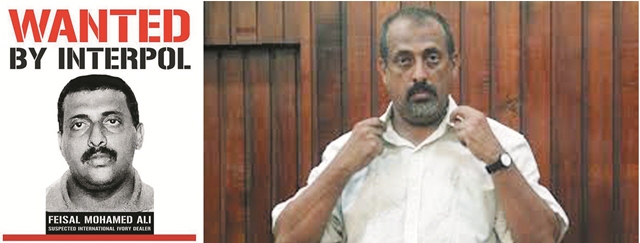By TZ Business News Staff.
Feisal Mohamed Ali, the Kenyan national arrested in Dar es Salaam, Tanzania, in late December, 2014, in connection with “dealing and possession of elephant tusks” will now be investigated for links to terrorism, the Kenyan police investigator Said Kitur has been reported as saying.
Ali faces charges in Kenya for alleged dealing and possession of more than two tonnes of elephant tusks found during a raid in June. The tusks came from at least 114 poached elephants.
The Illegal trade in wildlife trophies is often used to finance violence, according to the website Sabahi News. Britain’s Prince William, The Duke of Cambridge, told a wildlife protection conference in London earlier in 2014 that revenue from poaching was being used to finance terrorism. CNN television network quoted British and US Governments describing wildlife poaching in East Africa as “full blown organized crime”.
On Wednesday, December 24th, 2014, a Court in Mombasa placed charges on the suspected ivory-smuggling ‘Kingpin’ Feisal Mohamed Ali. The suspected ivory smuggling kingpin was described as an “environmental criminal” on an Interpol most-wanted list for smuggling tusks, the Website Sabahi News reported. The Interpol list contained nine most-wanted suspects linked to crimes against the environment.
Interpol agents in Dar es Salaam, Tanzania, arrested him and extradited him to Kenya where the charges were read to him in the Mombasa court. Ali is booked for allegedly dealing in wildlife trophies in breach of the Wildlife Conservation and Management Act. He pleaded not guilty but would remain in custody until December 30th when a bail hearing is set.
The London Guardian newspaper reported the suspected organised crime boss alleged to be a leading figure in the illegal ivory trade was arrested by Interpol agents in Tanzania and placed in custody at Msimbazi police station in Dar es Salaam before he was moved to Mombasa.
“Feisal Ali Mohammed was arrested by Interpol officers in Dar es Salaam. He was then booked in Musimbasi police station at 10:42pm…,” Kenya’s director of public prosecutions said in a statement. The statement said he is facing charges in Kenya’s port city of Mombasa for “dealing and possession of elephant tusks” weighing more than two tonnes and equivalent to at least 114 poached elephants, which were found during a raid in June.

A herd of elephants in Tarangire National Park, Tanzania. Photograph: Ingvild Holm/Environmental Investigation Agency
Two alleged accomplices, Abdul Halim Sadiq and Ghalib Sadiq Kara, were arrested then, but Mohammed managed to escape and has been on the run since. According to an Interpol source, Mohammed was caught in “a string operation” conducted in conjunction with Tanzanian police.
He is the second of the nine alleged “environmental criminals” listed by Interpol to have been arrested since the Interpol appeal last month. Earlier this month, Zambian national Ben Simasiku was arrested on charges of possessing ivory from Botswana.
In November, Interpol said the arrest of the suspects would “contribute to the dismantlement of transnational organised crime groups who have turned environmental exploitation into a professional business with lucrative revenues.”
Ivory is sought out for jewellery and decorative objects and much of it is smuggled to China, where many increasingly wealthy shoppers are buying ivory trinkets as a sign of financial success.
A sharp rise in poaching in Kenya, which is home to an estimated 30,000 elephants and just over a thousand rhinos, has sparked warnings from conservation groups that the government is losing the fight against the slaughter.




